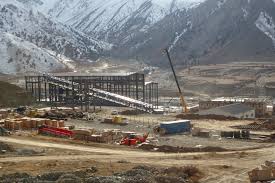Antimony, a relatively obscure element in the periodic table, has significant industrial and economic importance. Recently, China’s decision to restrict its antimony exports has drawn global attention, highlighting the strategic implications of this action. This explainer delves into what antimony is, its uses, and why China’s export curbs are causing ripples across various industries.
Table of Contents
What is Antimony?
It exists in two main forms: metallic antimony and its various compounds. Metallic antimony is a silvery, brittle substance, while its compounds are used in a range of applications. Found in nature primarily as part of minerals such as stibnite (Sb₂S₃), antimony is known for its unique properties, including high density, low thermal conductivity, and flame resistance.
Uses of Antimony
Antimony’s versatility makes it valuable across multiple industries:
- Flame Retardants: trioxide (Sb₂O₃) is a crucial ingredient in flame retardants. It works by enhancing the performance of halogen-based flame retardants in materials like plastics, textiles, and electronics. This application is particularly important for safety in various consumer and industrial products.
- Lead Alloys: is added to lead to increase its hardness and mechanical strength. Lead-antimony alloys are used in battery grids, ammunition, and cable sheathing, where durability and resistance to corrosion are essential.
- Electronics: In the electronics industry, antimony compounds are used in semiconductors and to improve the properties of certain types of glass. For example, antimony-based materials are used in the production of infrared detectors and in the glass for cathode ray tubes.
- Ceramics and Glass: is used in the production of certain types of glass and ceramics. It can enhance the appearance and durability of these materials, contributing to their color and clarity.
- Pharmaceuticals: Historically, antimony compounds have been used in medicine, although this is less common today due to the development of more effective treatments.
China’s Role in Antimony Production and Export
China is the world’s leading producer and exporter of It controls a significant portion of the global supply, making its policies on production and export crucial for international markets. The country’s dominance in this sector is due to its rich deposits of antimony ores and its well-established mining and processing infrastructure.
Reasons Behind China’s Export Curbs
- Resource Management and Environmental Concerns: One of the primary reasons for China’s export restrictions is the need to manage its natural resources more sustainably. mining and processing can have significant environmental impacts, including soil and water contamination. By curbing exports, China aims to reduce environmental damage and ensure more responsible resource management within its borders.
- Strategic Resource Control: is considered a strategic resource due to its importance in various critical industries. By controlling the global supply, China can leverage its position in international trade negotiations and ensure that its domestic industries have priority access to this essential material.
- Trade and Economic Leverage: Export restrictions can be used as a tool for economic leverage in trade relations. By curbing exports, China may be seeking to influence global markets and negotiate better terms in trade agreements or address trade imbalances.
- Market Stabilization: The global market has experienced volatility, partly due to fluctuations in supply and demand. China’s export restrictions could be aimed at stabilizing the market by controlling the volume of available internationally. This move could help prevent market crashes and ensure more predictable pricing for both producers and consumers.
- Support for Domestic Industry: By restricting exports, China can also bolster its domestic processing industry. The goal is to increase the value-added processing of within China, rather than exporting raw materials. This policy aligns with broader goals of industrial upgrading and economic development, creating jobs and fostering technological advancements within the country.

Global Implications
China’s export restrictions on have significant global repercussions:
- Price Increases: With China controlling a major share of the global antimony supply, any reduction in exports can lead to higher prices. Industries reliant on antimony, particularly those in flame retardants and lead alloys, may face increased production costs. This could lead to higher prices for end products, affecting consumers and businesses worldwide.
- Supply Chain Disruptions: Companies that depend on for their manufacturing processes may experience disruptions in their supply chains. This can lead to production delays, reduced output, and the need to find alternative sources or materials, which might not always be feasible.
- Geopolitical Tensions: strategic importance means that China’s export restrictions could heighten geopolitical tensions. Countries heavily reliant on antimony imports may seek to diversify their supply sources or engage in diplomatic negotiations with China to secure a stable supply.
- Encouragement of Alternative Solutions: Higher prices and potential supply shortages may drive innovation in the development of alternative materials or technologies. Industries affected by the restrictions might invest in research and development to find substitutes for , which could lead to new advancements in materials science.
- Increased Focus on Recycling: The restrictions could also spur increased efforts in recycling and recovering from used products. This focus on recycling can help mitigate some of the supply issues and reduce reliance on raw mining.
Conclusion
though not widely known outside specialized industries, plays a crucial role in various sectors, from electronics to flame retardants. China’s decision to curb its exports is driven by a mix of environmental concerns, strategic interests, and economic considerations. The impact of this decision extends globally, influencing prices, supply chains, and geopolitical dynamics.
As the world adjusts to these changes, industries affected by the export restrictions will need to navigate new challenges and seek alternative solutions. This situation underscores the interconnected nature of global resources and the complex interplay between national policies and international markets.







